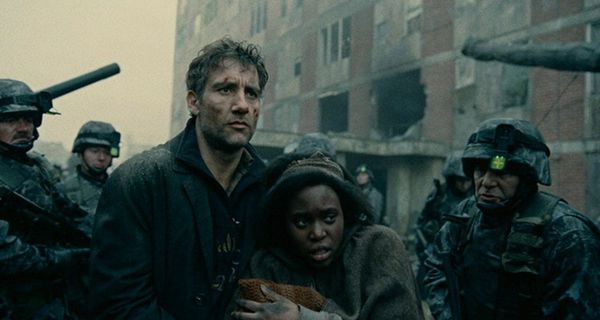Eye For Film >> Movies >> Children Of Men (2006) Film Review
Children Of Men
Reviewed by: Anton Bitel

Children Of Men is, like 1984 (or, for that matter, like V For Vendetta), set in a drab British police state of the not so distant future. Like Brazil, it opens with an explosive bang. Like Twelve Monkeys, it includes scenes of exotic animals (a zebra, a camel) in a metropolitan park. Like Soylent Green, it features state-sanctioned, sanitised suicide for the elderly and infirm. As in Last Night, the populace of the world must decide how to face their end time. And in a nod to A Clockwork Orange, one character is a drug-popping young man named Alex.
All of which is to say that Alfonso (Y Tu Mama También, Harry Potter And The Prisoner Of Azkaban) Cuarón's film is haunted by the anxiety of influence. Not only does Children Of Men position itself in a long line of dystopian science fiction, but it also allies itself to some of the genre's most intelligent and provocative works. Fortunately, far from merely hanging on those other films' coattails, Children Of Men makes a justifiable claim to join their exalted company as a classic of (and about) the future.

It is 2027, and a little over 18 years since the last baby was born. As the whole world is ravaged by mass infertility, environmental degradation and social unrest, Britain's response has been to embrace a totalitarian form of isolationism, whereby refugees, immigrants and foreigners in general are excluded from whatever shelter the nation can still offer, and penned up like animals before being deported. As a one-time political activist, Theo (Clive Owen) used to believe in a cause - but now, like so many others of his generation, his faith and hope have given way to a despondent cynicism. He has resigned himself to the approaching end.
Then, out of the blue, he is recruited by his ex-wife Julian (Julianne Moore) to help 'the Fishes' - a shadowy group committed to the rights of refugees - in their attempt to smuggle an illegal immigrant named Kee (Claire-Hope Ashitey) out of the country. Except that straight-talking Kee is no ordinary fugitive, but, as his old friend Jasper (Michael Caine) puts it, "the miracle the whole world has been waiting for" - for she is eight months pregnant. And as Theo becomes the young mother's guide, relying on individuals that he cannot trust to get to an organisation that may not exist, in a treacherous landscape and against increasingly desperate odds, he finds his faith restored that there are still things worth living (and dying) for.
One could be forgiven for supposing Children Of Men, with its vision of apocalyptic chaos and miraculous birth, to be a biblical allegory for the new millennium - and its religious underpinnings are further encoded in its title (a phrase from the Old Testament), in the name of its protagonist, and in the tendency of its characters to declare "Jesus Christ!" when they first encounter Kee's maternal state. At one point the heavily pregnant Kee even jokes that she is a virgin ("that'd be wicked, ay?").
Yet if Cuarón remains faithful to the theological preoccupations of Baroness P.D. James' original 1992 novel, he grounds them in a worldly hell that is all too recognisable as our own. For Theo's journey takes him from the ivory towers of the London elites, to the random violence and intrusive surveillance that plague the lives of the less privileged, and finally to a vast, overcrowded refugee camp (presented as a clear composite of Darfur, Guantanamo Bay, 1980s Beirut and Auschwitz) for the world's unwanted, abandoned and forgotten. And to highlight even more the proximity of this bleak future to the realities of the present, Cuarón has shot his film in a naturalistic style (handheld, up close and personal, dazzlingly long takes) that is more normally associated with news reportage than with the heavy stylisations and retro-futurism of so much other science fiction.
Similarly, Children Of Men boasts earthy characters and believable, human dialogue - again, something relatively rare in the genre. Cuarón and his co-writer Timothy J. Sexton avoid clunky exposition by making the features of their future world emerge naturally from the different characters' conversations (and occasional snatches of TV news in the background). They also have a knack for turning cinematic cliche on its head. What looks set to be a standard car chase sequence is slowed right down when the car fails to start and has to be literally pushed down a muddy hill, in a scene which is all the more thrilling and suspenseful precisely for running roughshod over the viewer's expectations. Later, a character walks through what can only be described as a war-zone (in one of the most horrific depictions of war's effects on civilians since Come And See) without once thinking to pick up a gun from the floor and play the Hollywood hero. And the headline actors' characters are apt to be killed off as suddenly and summarily as any extra. Such open breaches of convention allow Children Of Men to shock, confuse and surprise in equal measure.
There is little that can be faulted in Cuarón's film. Emmanuel Lubezki's camerawork is so immediate and fluid that its consummate artistry almost goes unnoticed until you stop to reflect on just how elaborate and busy each single take has been. The performances - from Clive Owen's jaded no-hoper to Julianne Moore's vital believer, from Michael Caine's impish dissident to Chiwetel Ejiofor's damaged idealist, from Claire-Hope Ashitey's bolshy mother-to-be to Peter Mullan's edgy border guard - are all superb, anchoring the film's more speculative material to people who feel real.
The only thing that strikes a false note here is unfortunately also something that it would be criminal to discuss in a review in anything but the most general of terms, given that it relates to the final sequence (and a sound heard over the closing credits). Suffice to say that, in a film that is for the most part devoted to subtly negotiating the dialectic between despair and hope, Children Of Men arbitrarily favours one over the other at its end instead of leaving the possibility of both open in the viewer's mind.
It is as though an authoritative moral has been artificially imposed at the eleventh hour, when everything before it merited - even demanded - a far less certain resolution. Had the film finished two minutes earlier than it in fact does, it would have been more interesting, far braver, and shown a greater faith in the intellect and independence of its audience. As it stands, however, in its last gasp Children Of Men coats viewers in the kind of schmaltz that it has until that point so assiduously eschewed.
A pity, too, because it is otherwise a perfect film.
Reviewed on: 19 Sep 2006




















